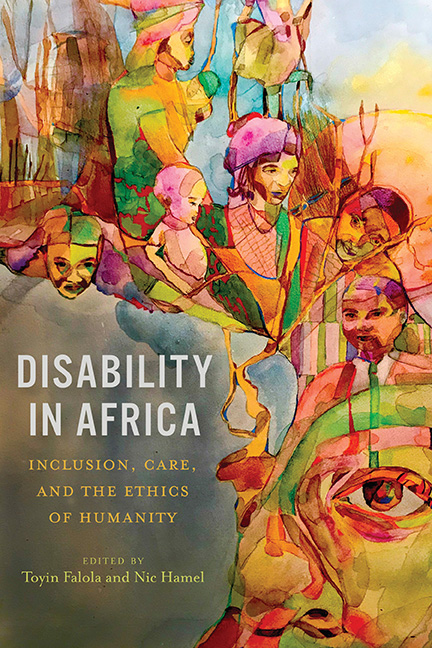Book contents
- Frontmatter
- Dedication
- Contents
- Part One Introducing the Field
- Part Two Theorizing Disability in Africa
- Part Three Representation and Cultural Expressions
- Part Four Education, Community, and Caregiving
- Part Five Activism and Barriers to Inclusion
- Conclusion: A Research Agenda for African Disability Studies
- Selected Bibliography
- Notes on Contributors
- Index
8 - Paradoxical Dramaturgies: Disability, Ritual, and Resistance in the Plays of Wole Soyinka
Published online by Cambridge University Press: 17 June 2021
- Frontmatter
- Dedication
- Contents
- Part One Introducing the Field
- Part Two Theorizing Disability in Africa
- Part Three Representation and Cultural Expressions
- Part Four Education, Community, and Caregiving
- Part Five Activism and Barriers to Inclusion
- Conclusion: A Research Agenda for African Disability Studies
- Selected Bibliography
- Notes on Contributors
- Index
Summary
The dramas of Nigerian dramatist, poet, novelist, and essayist (as well as Africa's first Nobel Laureate in literature) Wole Soyinka often combine seemingly disparate elements of West African subjects, cosmologies, and performance traditions with European tragedy and absurdism. He is acclaimed, and indeed canonized, by literary and theatrical critics, primarily for what Biodun Jeyifo describes as “a convergence of the aesthetic and political radicalism which, apart from Soyinka, we encounter only in a few other African writers.” However, alongside the copious praise he has received over the last several decades, Soyinka has also developed a reputation as an often difficult writer, or even an obscurantist. Critics like Bernth Lindfors and others lament that Soyinka's dramaturgically and culturally complex works too often contain “enigmatic obfuscations,” which are “perverse and irresponsible” for an artist who ostensibly values ethical social commitments. To interpret the political content of Wole Soyinka's dramas requires a focused consideration of context and nuance, particularly when approaching as overdetermined and ambiguous a concept as disability. Many of the literary tools developed by critical disability studies cannot easily be applied to Soyinka's dramatic creations and the readings demanded by their particular Yoruban contexts.
Disability and disabled characters are ubiquitous in Soyinka's plays, and fulfill a multiplicity of dramaturgical functions, operating variously as metaphor or metonym for vulnerability, mysticism, and postcolonial debilitation. Yet disability in Soyinka is not easily articulated in the terms developed by traditional disability studies. As articulated by Afro-Caribbean poet, playwright, and fellow Nobel Laureate, Derek Walcott:
One does not need to look very far for the usual location of such characters in Soyinka's writings … in the spaces between worlds—the worlds of the living, the dead and the unborn … here reside the dwarfs, cripples, and idiots in Soyinka's plays—all of the usual candidates for grotesque status. No particular stigma attaches to any of these figures … they all partake of the special dangerous energy of transition that lies in the space between worlds … they have the capacity to explode contradiction into power and energy.
- Type
- Chapter
- Information
- Disability in AfricaInclusion, Care, and the Ethics of Humanity, pp. 185 - 208Publisher: Boydell & BrewerPrint publication year: 2021



